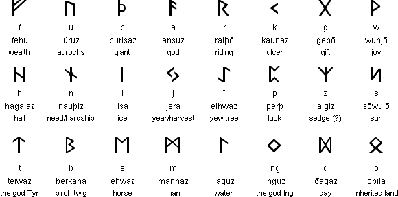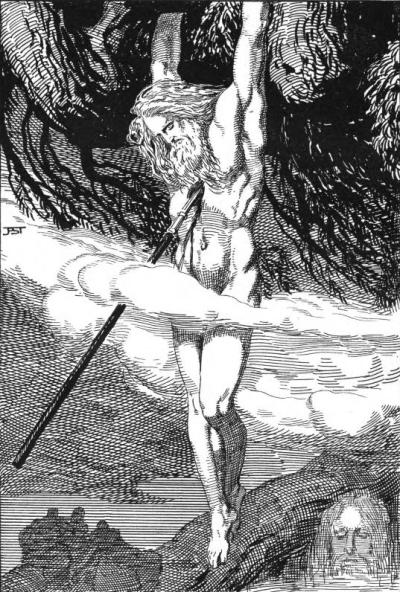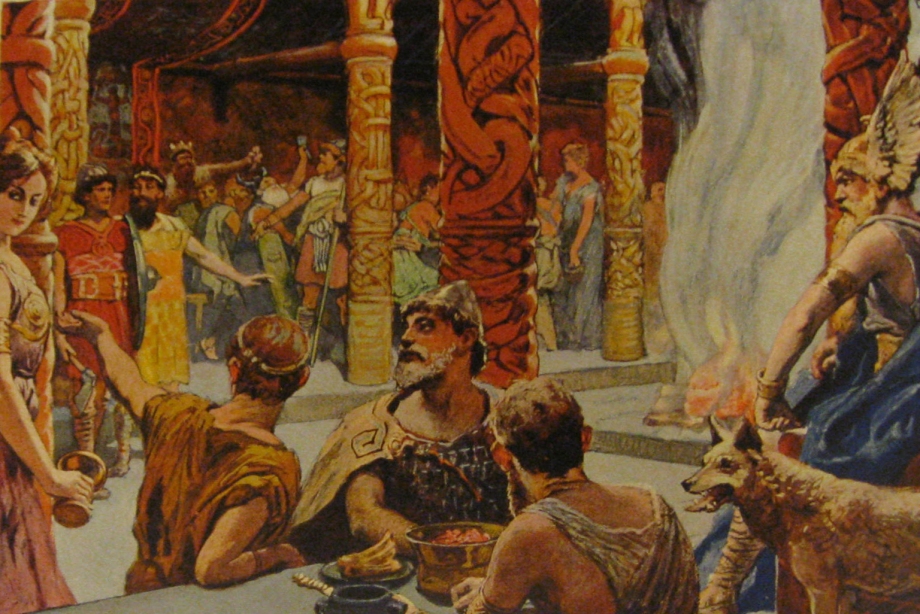 I’ve spent a few weeks now running through the runes, trying to give a feel for the different ways the runes are treated in poetry in different cultures, the more literary Icelanders, the Vikings of Norway, the melting pot of the Anglo-Saxons of Old England. Hopefully now we have most of the raw material to understand some of the breadth and depth that comes from what the runes were used for by the ancient Germanic peoples themselves. An in-depth post on one rune, or on a theme related to the runes, should be possible now given the knowledge available to you now.
I’ve spent a few weeks now running through the runes, trying to give a feel for the different ways the runes are treated in poetry in different cultures, the more literary Icelanders, the Vikings of Norway, the melting pot of the Anglo-Saxons of Old England. Hopefully now we have most of the raw material to understand some of the breadth and depth that comes from what the runes were used for by the ancient Germanic peoples themselves. An in-depth post on one rune, or on a theme related to the runes, should be possible now given the knowledge available to you now.
Before I move on, I want to mention two things. First, to redirect you to a previous post that hit the runelore heavily but which mostly glossed over details of the runes at the time: the tale of the meeting of Brunnhilde and Sigurd. Sigurd awoke Brunnhilde from a deep sleep, and before sending him back on his way, Brynhildr (variation on the name is intentional) told Sigurd the Dragonslayer some ways he might improve his odds in victory in the future, through knowledge of the runes.

And second, I am drawn to the tale of Odin’s sacrifice on the tree Yggdrasil, when he pierced himself with his spear and learned of the runes. Now that you know something of what the runes are, what they look like and how they function, you might want to read a part of Havamal you might have glossed over before, the part that comes after Odin tells of his sacrifice on the wind-swept tree. He tells specifics about the rune-knowledge he gained as he peered into the depths.
Whether the knowledge Brunnhilde and Odin share in their major poems is decipherable from the knowledge we have from the three major rune-poems is a bigger question. The runesongs Odin knows, about healing, battle, knowledge, and more, are clearly about more than just the combinations of a rune or two or three. More properly, I expect that they’re best understood as a deeper understanding of the names of things, and the nature of things. And therefore, how words can change things, as I explained in my first post in this series on the runes. But they’re not step-by-step instructions, and there probably never were such instructions. Instead, since Brunnhilde was a Valkyrie, a servant of Odin, it can probably be understood instead that the content of these two poems was the expression of the animistic powers, representing that there was a deeper order to the universe, just beyond the grasp of humans.
But feel free to speculate, and try to understand these concepts in your own way.
Selection from Hávamál
Taken from the translation by Olive Bray, edited by D.L. Ashliman.
Odin’s Quest after the Runes
137.
I trow I hung on that windy Tree
nine whole days and nights,
stabbed with a spear, offered to Odin,
myself to mine own self given,
high on that Tree of which none hath heard
from what roots it rises to heaven.
138.
None refreshed me ever with food or drink,
I peered right down in the deep;
crying aloud I lifted the Runes
then back I fell from thence.
139.
Nine mighty songs I learned from the great
son of Bale-thorn, Bestla’s sire;
I drank a measure of the wondrous Mead,
with the Soulstirrer’s drops I was showered.
140.
Ere long I bare fruit, and throve full well,
I grew and waxed in wisdom;
word following word, I found me words,
deed following deed, I wrought deeds.
141.
Hidden Runes shalt thou seek and interpreted signs,
many symbols of might and power,
by the great Singer painted, by the high Powers fashioned,
graved by the Utterer of gods.
142.
For gods graved Odin, for elves graved Daïn,
Dvalin the Dallier for dwarfs,
All-wise for Jötuns, and I, of myself,
graved some for the sons of men.
143.
Dost know how to write, dost know how to read,
dost know how to paint, dost know how to prove,
dost know how to ask, dost know how to offer,
dost know how to send, dost know how to spend?
144.
Better ask for too little than offer too much,
like the gift should be the boon;
better not to send than to overspend.
……..
Thus Odin graved ere the world began;
Then he rose from the deep, and came again.
The Song of Spells
145.
Those songs I know, which nor sons of men
nor queen in a king’s court knows;
the first is Help which will bring thee help
in all woes and in sorrow and strife.
146.
A second I know, which the son of men
must sing, who would heal the sick.
147.
A third I know: if sore need should come
of a spell to stay my foes;
when I sing that song, which shall blunt their swords,
nor their weapons nor staves can wound.
148.
A fourth I know: if men make fast
in chains the joints of my limbs,
when I sing that song which shall set me free,
spring the fetters from hands and feet.
149.
A fifth I know: when I see, by foes shot,
speeding a shaft through the host,
flies it never so strongly I still can stay it,
if I get but a glimpse of its flight.
150.
A sixth I know: when some thane would harm me
in runes on a moist tree’s root,
on his head alone shall light the ills
of the curse that he called upon mine.
151.
A seventh I know: if I see a hall
high o’er the bench-mates blazing,
flame it ne’er so fiercely I still can save it, —
I know how to sing that song.
152.
An eighth I know: which all can sing
for their weal if they learn it well;
where hate shall wax ‘mid the warrior sons,
I can calm it soon with that song.
153.
A ninth I know: when need befalls me
to save my vessel afloat,
I hush the wind on the stormy wave,
and soothe all the sea to rest.
154.
A tenth I know: when at night the witches
ride and sport in the air,
such spells I weave that they wander home
out of skins and wits bewildered.
155.
An eleventh I know: if haply I lead
my old comrades out to war,
I sing ‘neath the shields, and they fare forth mightily
safe into battle,
safe out of battle,
and safe return from the strife.
156.
A twelfth I know: if I see in a tree
a corpse from a halter hanging,
such spells I write, and paint in runes,
that the being descends and speaks.
157.
A thirteenth I know: if the new-born son
of a warrior I sprinkle with water,
that youth will not fail when he fares to war,
never slain shall he bow before sword.
158.
A fourteenth I know: if I needs must number
the Powers to the people of men,
I know all the nature of gods and of elves
which none can know untaught.
159.
A fifteenth I know, which Folk-stirrer sang,
the dwarf, at the gates of Dawn;
he sang strength to the gods, and skill to the elves,
and wisdom to Odin who utters.
160.
A sixteenth I know: when all sweetness and love
I would win from some artful wench,
her heart I turn, and the whole mind change
of that fair-armed lady I love.
161.
A seventeenth I know: so that e’en the shy maiden
is slow to shun my love.
162.
These songs, Stray-Singer, which man’s son knows not,
long shalt thou lack in life,
though thy weal if thou win’st them, thy boon if thou obey’st them
thy good if haply thou gain’st them.
163.
An eighteenth I know: which I ne’er shall tell
to maiden or wife of man
save alone to my sister, or haply to her
who folds me fast in her arms;
most safe are secrets known to but one-
the songs are sung to an end.
164.
Now the sayings of the High One are uttered in the hall
for the weal of men, for the woe of Jötuns,
Hail, thou who hast spoken! Hail, thou that knowest!
Hail, ye that have hearkened! Use, thou who hast learned!

